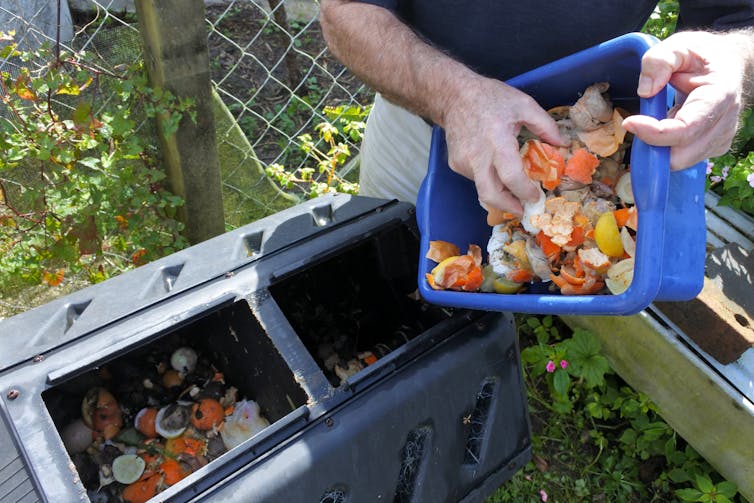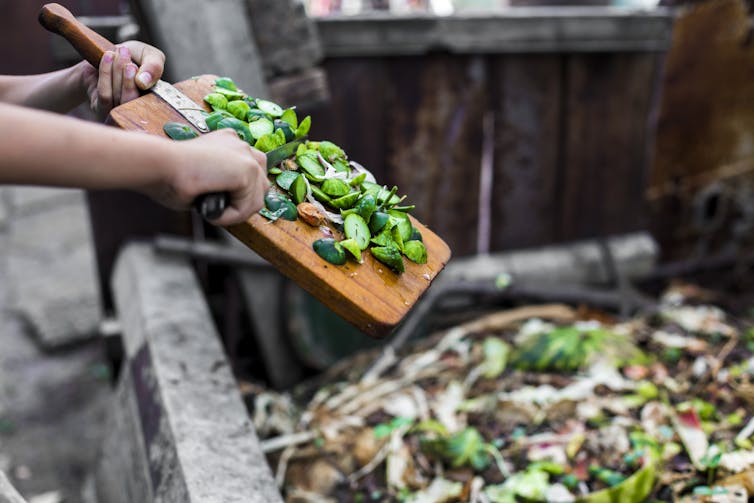What can go in the compost bin? Tips to help your garden and keep away the pests
- Written by Cheryl Desha, Associate Professor, School of Engineering and Built Environment, and Director, Engagement (Industry), Griffith University
Pretty soon, many more Australians are going to be composting their food waste. The Victorian government kicks off its four-bin system from this year, and the federal government is considering a plan to turn kitchen scraps into fertiliser for farmers.
But knowing exactly what to put in your compost bin can be tricky – and views differ on whether you should add items such as meat and citrus.
Composting is fairly simple, but it’s important to get it right. Otherwise, your compost mix may be too slimy or smelly, or attract vermin.
We are experts in food resilience and sustainability, and have prepared this “dos and don'ts” guide to get you on your way.
Your own composting system
Composting is a way of doing what happens in nature, where raw organic materials are converted to soft and spongy soil-like grains. These help soil retain water and make nutrients available to plants.
In fact, compost is so valuable for your garden, it’s often referred to as “black gold”.
For those of you composting at home, here’s how to make sure the system delivers what you need for your home gardening projects.
 Your bin should be made up of one part green waste and two parts brown waste.
Shutterstock
Your bin should be made up of one part green waste and two parts brown waste.
Shutterstock
Dos:
• use a couple of bottomless bins so when one is full you can start on the other, in a shady spot
• have a good mix of “browns” (two parts) and “greens” (one part). Combine brown materials (hay, straw, sawdust, woodchips, leaves, weeds that have not gone to seed) with food scraps and other materials (fruit and vegetable peels and rinds, tea bags, coffee grounds, eggshells), and some types of animal manure (chicken, cow, horse)
• let the temperature climb. Heat in the centre of your compost pile is a good sign, as the microbes are breaking down what you’ve put in. As the compost matures it cools, creating a great environment for worms and other microbes to finish off the process
• make sure your coffee grounds and tea bags can break down, so remove the bag before you add it to the compost pile. Moist tea leaves can help your pile break down faster. Citrus fruit (lemons, oranges), spicy peppers, onion and garlic are fine, just don’t add them to your worm farm; the worms will suffer under the acidic conditions produced when these items break down
• get creative with natural “brown” materials - as long as there is no plastic mixed in, throw it in. This includes anything from cereal boxes to cotton balls, wine corks, fireplace ashes, and even human hair and pet fur.
Read more: We've had a taste of disrupted food supplies – here are 5 ways we can avoid a repeat
 Citrus and onion are fine, avoid meat scraps.
Shutterstock
Citrus and onion are fine, avoid meat scraps.
Shutterstock
Don’ts:
• don’t let your compost bin be a feast for local rodents such as rats. Bury the base slightly into the ground, lining the bin with wire mesh and keeping it covered. Avoid adding meat scraps, cooking fats and oils, milk products and bones, which will attract vermin
• don’t let your compost get stinky or slimy – that means it’s too wet. Slimy compost means you need to add more “brown” materials. You can also speed things along by having a dig through the heap every week or so, or adding extra bits and pieces at various stages (chook poo, crushed rock and lime) to help it all happen faster
• don’t let nasty chemicals and germs get into your compost. This includes things like treated wood waste, pet waste (if they take medication or eat meat) and sick plants. Home compost bins are limited in what they can process. It is a good idea to wear gloves as an extra safety measure.
Council compost collection
Local councils are increasingly offering food waste collection programs, sometimes along with garden green waste. In such cases, these materials are processed at large scale composting sites
In Victoria, a four-bin waste and recycling system will be rolled out in partnership with councils. Most households will be using this system by 2030.
Gold Coast City Council City recently diverted 553 tonnes of food waste from landfill during a one-year trial. The program helps address home composting space challenges for the region’s many apartment and high-rise dwellers.
If your council offers food waste collection, make sure you follow their particular “dos and don'ts” advice. Depending where you live, it may differ slightly to ours.
Read more: Fertile ground: what you need to know about soil to keep your garden healthy
To bag, or not to bag?
Working out how to bag up your food scraps – whether for your home bin or council collection – can be confusing. Check your local instructions for kerbside collection to make sure your food waste is bagged in the right way.
You can try putting “home compostable” bags in your own compost bin, experimenting with your bin temperature to achieve the best outcome. Compostable plastic“ is designed to break down back into nutrients, but most still need managed, high-heat conditions to activate this process.
Don’t be tricked by "degradable” bags - these are likely to be made of plastic and just break into millions of tiny pieces. Also, as others have written, some “biodegradable” plastics made of plant-based materials might not be better for the environment, and they can take just as long to degrade as traditional plastics.
The benefits of composting
Making compost at home doesn’t just lighten our rubbish bin and help our gardens. It also helps tackle climate change.
Each year in Australia, food waste rotting in landfill creates methane equivalent to around 6.8 million tonnes of carbon dioxide. If global food waste were a country, it would be the third-largest emitter of greenhouse gases in the world, behind the United States and China.
So clearly, there are many great reasons to compost. And by following a few simple rules, you too can create your own “black gold”.
Authors: Cheryl Desha, Associate Professor, School of Engineering and Built Environment, and Director, Engagement (Industry), Griffith University





